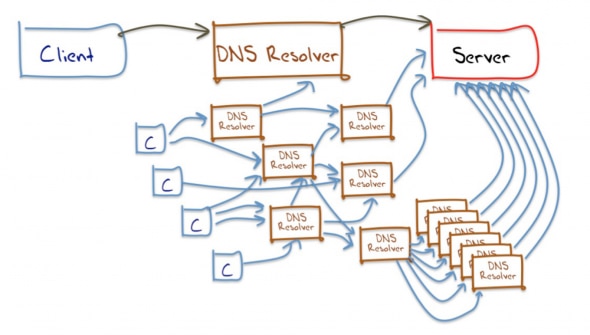The Domain Name System (DNS) is used to resolve human-readable hostnames into machine-readable IP addresses. It also provides other useful info about domain names, such as mail services.

In other words, DNS is like a phonebook of the Internet. If you know a person’s name but don’t know their telephone number, you can simply look it up in a phone book. DNS provides this same service. That’s exactly why DNS is critical for any organization that relies on the Web to connect to customers, partners, suppliers and employees.
How One AI-Driven Media Platform Cut EBS Costs for AWS ASGs by 48%

Let’s roll out the key features of hostname to IP mapping:
- Mappings of addresses to names and vice versa (known as records) are stored in a database.
- The DNS database is distributed.
- A DNS database also stores additional records.
DNS makes the difference between a Website being visible or not. If you want your website available, it has to be running all the time, secure, scalable and exhibit high performance.
There are several key benefits worth noting:
- Performance: overcome network latency experienced by geographically distributed users.
- Security: decrease vulnerability to spoofing and distributed denial of service (DDoS) attacks.
- Reliability: guarantee internet domain queries are consistently and correctly resolved.
- Availability: ensure users can reach your website at any given time.
- Scalability: manage increased traffic as an organization’s business grows.
Certain DNS servers may have outdated records. Some servers may have inefficient records that point your data packets towards the scenic route, taking you all around the Internet before the packets can reach the destination. If you can track the most efficient DNS servers paths, then you can cut away that excess travel time. A crazy little thing called DNS optimization.
The biggest challenge for most companies is that DNS is a complex system that requires an array of software, network infrastructure, hardware and specialized knowledge. Building and managing a DNS system is both costly and technically challenging. Since the emergence of technology standards such as DNSSEC, the whole matter is further complicated. Setting up your own DNS infrastructure isn’t the only choice though.
Cloud DNS
Cloud DNS is scalable, reliable and secure – it offers high performance under high traffic spikes from anywhere in the world. It’s a purpose-built, aways-on web solution, made to address the web performance needs of any business that relies on the internet. Cloud DNS providers often have a suite of services, when used in conjunction with the Cloud DNS, provide great web performance without large upfront capital costs of technology investments. We’ll break down the pros to using a cloud DNS service into a few points:
1. It’s simple to use and understand
By using your provider’s service plans, you don’t need to worry about the details of keeping a global DNS infrastructure running. You just set your records and kick back, free to focus your time on other pending issues. You pay for a reliable service that’s run by experts. It’s also important to note that this is by far the best choice for companies and startups that run on a tight budget and don’t have the expertise to cover all grounds.
2. It’s secure
Security is always the top priority when running a web business. DDoS are on the rise; a successful attack greatly impacts customer trust which reflects on web sales. A cloud DNS service offers a distributed architecture, zone transfers and secure testing environments. Some of the following approaches are used to tighten up security;
- Overprovisioning machine resources
- Implementing basic validity-checking
- Rate-limiting requests
- Removing duplicate queries
- Adding entropy to request messages
- Securing your code against buffer overflows
3. It boosts your performance
Small businesses or home users typically use the default DNS server of their internet service provider, but other DNS providers are often faster. There is a number of thing that a cloud DNS provider does to keep your performance sharp:
- Provisioning servers adequately to handle the load from client traffic, including malicious traffic.
- Preventing DoS and amplification attacks – granted, this is a security measure, but it also has a benefit for performance by eliminating the extra traffic burden placed on DNS servers.
- Load-balancing for shared caching, to improve the aggregated cache hit rate across the serving cluster.
- Providing global coverage for proximity to all users.
4. You get 24/7 support
There’s no need to juggle through all of the aspects of DNS hosting and maintenance. By hiring a cloud CDN provider, you have a specialized team to back you up, anytime. Each time you face a problem, you can contact customer support and get the problem fixed asap. When your website is facing difficulties, every second counts. Having a support team is the most reliable way to keep your business up and running at all time.






